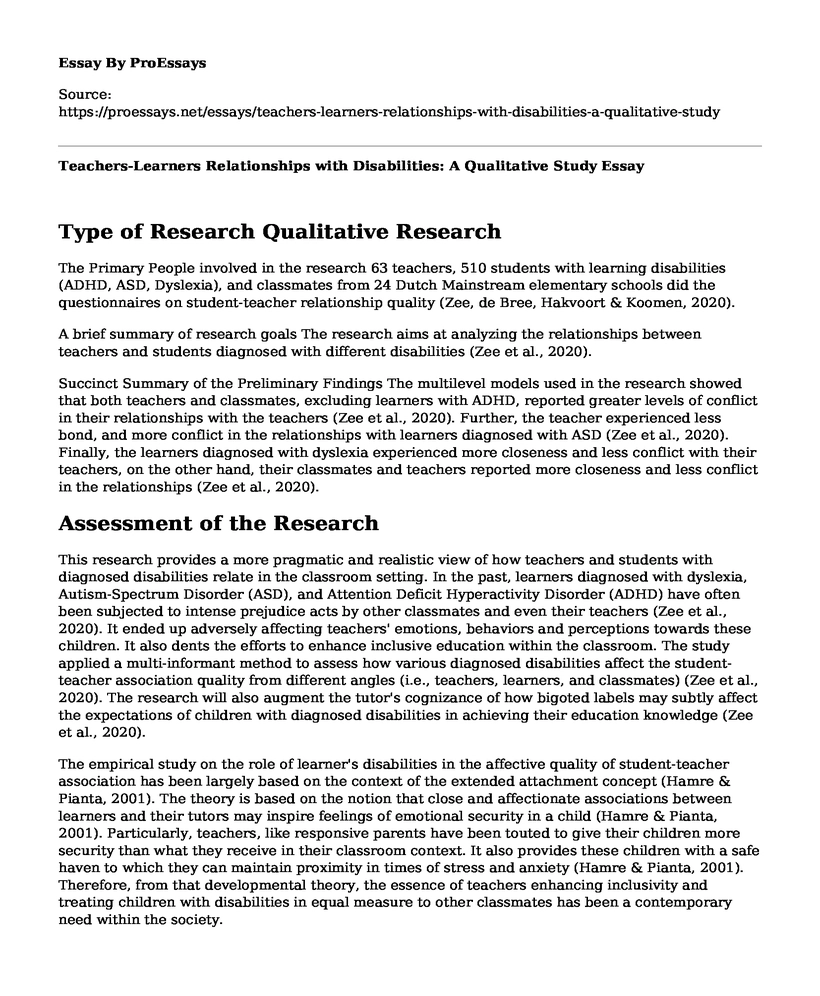Type of Research Qualitative Research
The Primary People involved in the research 63 teachers, 510 students with learning disabilities (ADHD, ASD, Dyslexia), and classmates from 24 Dutch Mainstream elementary schools did the questionnaires on student-teacher relationship quality (Zee, de Bree, Hakvoort & Koomen, 2020).
A brief summary of research goals The research aims at analyzing the relationships between teachers and students diagnosed with different disabilities (Zee et al., 2020).
Succinct Summary of the Preliminary Findings The multilevel models used in the research showed that both teachers and classmates, excluding learners with ADHD, reported greater levels of conflict in their relationships with the teachers (Zee et al., 2020). Further, the teacher experienced less bond, and more conflict in the relationships with learners diagnosed with ASD (Zee et al., 2020). Finally, the learners diagnosed with dyslexia experienced more closeness and less conflict with their teachers, on the other hand, their classmates and teachers reported more closeness and less conflict in the relationships (Zee et al., 2020).
Assessment of the Research
This research provides a more pragmatic and realistic view of how teachers and students with diagnosed disabilities relate in the classroom setting. In the past, learners diagnosed with dyslexia, Autism-Spectrum Disorder (ASD), and Attention Deficit Hyperactivity Disorder (ADHD) have often been subjected to intense prejudice acts by other classmates and even their teachers (Zee et al., 2020). It ended up adversely affecting teachers' emotions, behaviors and perceptions towards these children. It also dents the efforts to enhance inclusive education within the classroom. The study applied a multi-informant method to assess how various diagnosed disabilities affect the student-teacher association quality from different angles (i.e., teachers, learners, and classmates) (Zee et al., 2020). The research will also augment the tutor's cognizance of how bigoted labels may subtly affect the expectations of children with diagnosed disabilities in achieving their education knowledge (Zee et al., 2020).
The empirical study on the role of learner's disabilities in the affective quality of student-teacher association has been largely based on the context of the extended attachment concept (Hamre & Pianta, 2001). The theory is based on the notion that close and affectionate associations between learners and their tutors may inspire feelings of emotional security in a child (Hamre & Pianta, 2001). Particularly, teachers, like responsive parents have been touted to give their children more security than what they receive in their classroom context. It also provides these children with a safe haven to which they can maintain proximity in times of stress and anxiety (Hamre & Pianta, 2001). Therefore, from that developmental theory, the essence of teachers enhancing inclusivity and treating children with disabilities in equal measure to other classmates has been a contemporary need within the society.
The study concentrated on a combination of the behavior related development disabilities and learning disabilities. The behavior connected developmental disabilities seemed more viable since teachers and parents can detect a change in character or behavior with ease than focusing on their learning disabilities (Rogers & Tannock, 2018). For example, learners with ASD will exhibit the following symptoms; lack of social communication or interest with others (staying in seclusion) (Rogers & Tannock, 2018). According to research conducted in the Netherlands, the introduction of inclusive education in elementary school have significantly reduced the prevalence rates of behavior related developmental disabilities; For instance; ADHD was estimated to be 1-20% prevalence rate, 1 and 2% for ASD, and 5-10% for dyslexia (Zee et al., 2020).
Conclusion
In conclusion, the study attempts to show that behavior-related disabilities, more than learning disorders may be the main factors affecting the quality relationship between teachers and learners. In a nutshell, teachers experienced less bond and more quarrel in relation to children with ASD symptoms and greater levels of conflicts in associations with children having ADHD. Finally, there is a possibility for future developmental psychology, such as how genetic inheritance (our nature) interacts with out experiences to influence on developmental growth (Zee et al., 2020).
References
Hamre, B. K., & Pianta, R. C. (2001). Early teacher-child relationships and the trajectory of children's school outcomes through eighth grade. Child development, 72(2), 625-638. Retrieved from: https://www.healthiersf.org/RestorativePractices/Resources/documents/RP%20Community%20Resources%20and%20Articles/Power%20of%20Relationships/Early%20Teacher-Child%20Relationships%20and%20the%20Hamre%202001.pdf
Rogers, M., & Tannock, R. (2018). Are classrooms meeting the basic psychological needs of children with ADHD symptoms? A self-determination theory perspective. Journal of attention disorders, 22(14), 1354-1360. Retrieved from: https://journals.sagepub.com/doi/pdf/10.1177/1087054713508926
Zee, M., de Bree, E., Hakvoort, B., & Koomen, H. M. (2020). Exploring relationships between teachers and students with diagnosed disabilities: A multi-informant approach. Journal of Applied Developmental Psychology, 66, 101101. Retrieved from: https://www.sciencedirect.com/science/article/pii/S0193397319300772
Cite this page
Teachers-Learners Relationships with Disabilities: A Qualitative Study. (2023, Mar 25). Retrieved from https://proessays.net/essays/teachers-learners-relationships-with-disabilities-a-qualitative-study
If you are the original author of this essay and no longer wish to have it published on the ProEssays website, please click below to request its removal:
- Narrative Essay: A Bad Monday Morning
- Essay Sample on Piaget's Cognitive Development of Adolescents
- Essay on Different Cultural Constructions of Childhood
- Paper Example on Kids and Divorce: Dealing With Negative Behaviors
- Personal Statement on Applying for a Ph.D. in Materials Science and Engineering
- Gaining Power Through Nonverbal Communication - Free Essay Sample
- Free Paper on Shifting Paradigms: Examining Asian Students' Trend Towards Higher Education in Germany







